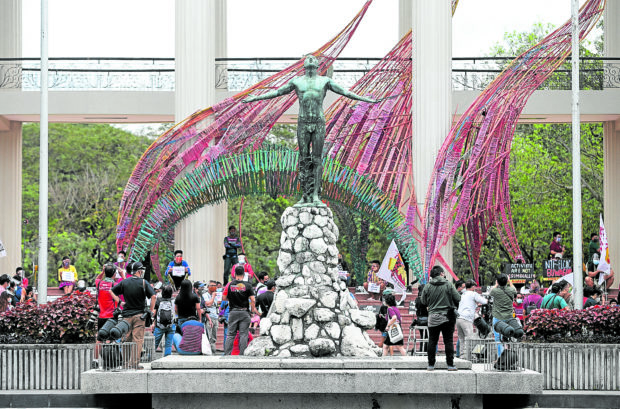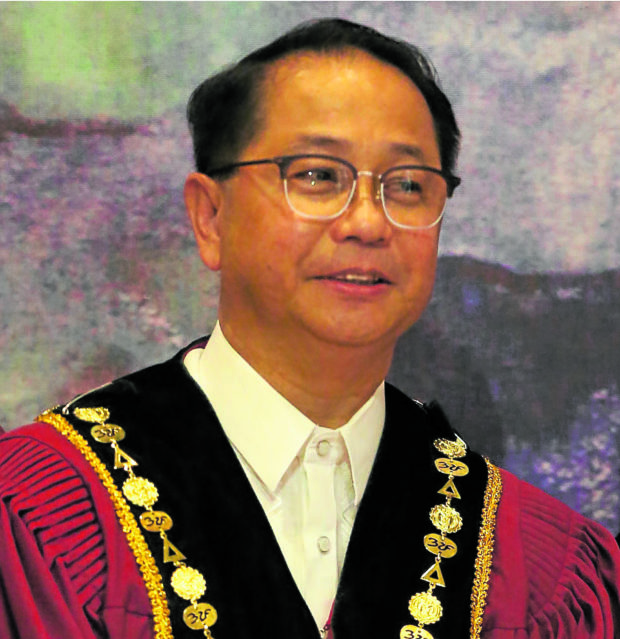UP community slams scrapping of DND pact

INDIGNATION A wave of indignation sweeps University of the Philippines campuses, including the main one in Diliman, Quezon City, over the Department of National Defense’s unilateral abrogation of its June 30, 1989, accord with the UP System that bars policemen and soldiers from its campuses. —NIÑO JESUS ORBETA
Students, faculty and graduates of the University of the Philippines (UP), including many politicians, were outraged and shocked by the unilateral termination of a 1989 accord between the Department of National Defense (DND) and UP to ban security forces from its campuses nationwide.
In a letter to UP president Danilo Concepcion, Defense Secretary Delfin Lorenzana said the DND abrogated last week the agreement between then UP president Jose Abueva and then Defense Secretary Fidel Ramos, saying the accord was being used by the Communist Party of the Philippines (CPP) and the New People’s Army (NPA) as a “shield” for their recruitment.
Hundreds who rallied on Tuesday on the UP Diliman campus denounced the DND’s move as a means to stifle both academic freedom and political dissent not just in the state university but also in other schools, which officials claimed have become a safe haven for activists and critics of President Duterte.
Vice President Leni Robredo, a graduate of UP’s School of Economics, said in a statement that the purpose of the nearly 31-year-old accord “was not to exempt UP or its community from any law, but to send the clear message that in a democracy, law enforcement was conducted following clear rules with defined limits.”
“Clearly, then, this is not a practical gesture, but a symbolic one, one designed to sow fear. One designed to discourage dissent. One designed to discourage criticism,” she said.
Concepcion, who joined the indignation rally on Tuesday, called Lorenzana’s action a “nightmare.”
Hallowed ground
“Many don’t understand that the accord is what gives our students and teachers freedom to be creative and vigorous because they know nobody will censor their works or [surveil] them … even if what they do goes against state ideology,” he said in a speech. “That is what academic freedom means.”
“If academic freedom is removed from UP, then UP will lose its purpose and meaning,” Concepcion said.
Presidential spokesperson Harry Roque, who studied and taught law at UP, said the defense chief was an alter ego of the President so, “of course, the President supports the decision of Secretary Lorenzana.”
He pointed out that academic freedom was enjoyed in universities in the United States and United Kingdom despite police presence.
Students and teachers at UP Los Baños (UPLB) and UP Visayas (UPV) also denounced the abrogation of the accord.
UPLB chancellor Jose Camacho Jr. said that as “a bastion for the expression of ideas, ideals and advocacies and as a sanctuary for the exercise of our cherished rights and freedoms, UP is hallowed ground for activism and dissent, not rebellion.”
In a statement, UP Visayas chancellor Clement Camposano said the “sordid reality of recent killings, abductions and other forms of human rights abuses widely believed to have been perpetrated by security forces cannot but leave us unassured” that the government would guarantee the protection of rights and freedoms.
In a joint statement, the UPV University Student Council, college councils and student organizations said the accord’s abrogation “legitimizes further attacks and harassment against members of the UP community, as well as empowering state forces to stifle our basic constitutional right to dissent.”
Pambansang Lakas ng Kilusang Mamamalakaya ng Pilipinas slammed Lorenzana’s “misplaced priorities.”
‘Unwarranted’
“In our Chinese-occupied marine territory is where the police and military should be constantly patrolling, not inside campuses,” Fernando Hicap, the group’s chair, said in a statement.
Green group Kalikasan People’s Network for the Environment said UP must maintain its academic freedom and historic role as a space for democratic activism and a refuge for “indigenous peoples, national minorities and farmers protesting mining plunder, land grabs and other attacks against their ancestral lands.”
Concepcion wrote back to Lorenzana urging the defense chief to reconsider the “totally unnecessary and unwarranted” termination of the accord.
“Instead of instilling confidence in our police and military, your decision can only sow more confusion and mistrust, given that you have not specified what it is that you exactly aim to do or put in place in lieu of the protection and courtesies afforded by the agreement,” he said.
“… Given our experience of martial law, we must reject any form or semblance of militarization on our campuses, which will have a chilling effect deleterious to academic freedom,’’ Concepcion added.
‘Don’t mess with UP’
Muntinlupa City Rep. Ruffy Biazon, vice chair of the House national defense and security committee, said the “sudden and unilateral termination” of the agreement “may have an opposite outcome” of its objective to reach out to the youth.
“The irony is that instead of ‘protecting and securing the institution and youth against the enemies of the Filipino people,’ it will provide a basis for the Armed Forces and police to be seen as the enemy of the institution and the youth,” Biazon said.
Sen. Francis Pangilinan, who chaired UP’s University Student Council in 1986, at the height of protests against dictator Ferdinand Marcos, said the university “has always been and will always be a citadel of freedom and democracy.”
“Please don’t mess with UP,” he said in a series of posts on Twitter.
Sen. Nancy Binay, a UP graduate, said abrogating the agreement was not a solution to the insurgency.
“Instead of fostering unity as a people, the unnecessary abrogation of the agreement will only breed more mistrust and bring us far apart,” she said.
Obsolete
Her father, former Vice President Jejomar Binay, said that after being incarcerated during the Marcos dictatorship, he saw Lorenzana’s move as “a step backward.”
“It does not protect students. It exposes them to greater danger. It does not protect academic freedom and democracy. It undermines them,” he said in a statement.
In a statement on Tuesday, Lorenzana defended his move, saying the 1989 accord was “obsolete” and that UP “has become a safe haven for enemies of the state.”
But Sen. Risa Hontiveros said Lorenzana was just “propping up the ‘communist bogeyman’’’ as an excuse for Red-tagging and disregarding human rights.
Police Brig. Gen. Ildebrandi Usana, spokesperson for the Philippine National Police, assured the public that despite the scrapping of the UP-DND accord there would be, “No crackdown. No arrests without warrant. No militarization.” —WITH REPORTS FROM KRIXIA SUBINGSUBING, DJ YAP, JULIE M. AURELIO, LEILA B. SALAVERRIA, JHESSET O. ENANO, DEXTER CABALZA, JEANNETTE I. ANDRADE, MARICAR CINCO, NESTOR P. BURGOS JR. AND JOEY GABIETA INQ
